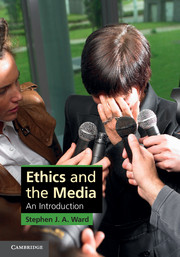3 - Free press and deliberative democracy
Published online by Cambridge University Press: 05 June 2012
Summary
In late 2010, the web site WikiLeaks provided online access to hundreds of confidential cables sent by American diplomats abroad to the US government, obtained from an unnamed source. They contained candid observations about world leaders and an analysis of the political motivations of countries from North Korea to Iran. Major news organizations used the cables as the basis of news stories.
The web site’s actions caused a worldwide debate on whether journalists, news media, and web sites should publish secret documents. Julian Assange, the director of the web site, argued that the release of the embarrassing and sensitive documents was the proper work of a free press. Journalists, he noted, have long exercised their freedom to publish confidential documents so that they can fulfil their obligation to inform the public about what their governments are doing in secret.
- Type
- Chapter
- Information
- Ethics and the MediaAn Introduction, pp. 88 - 117Publisher: Cambridge University PressPrint publication year: 2011



